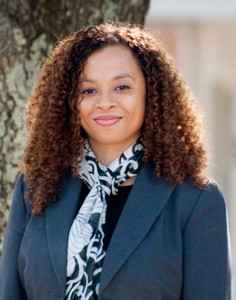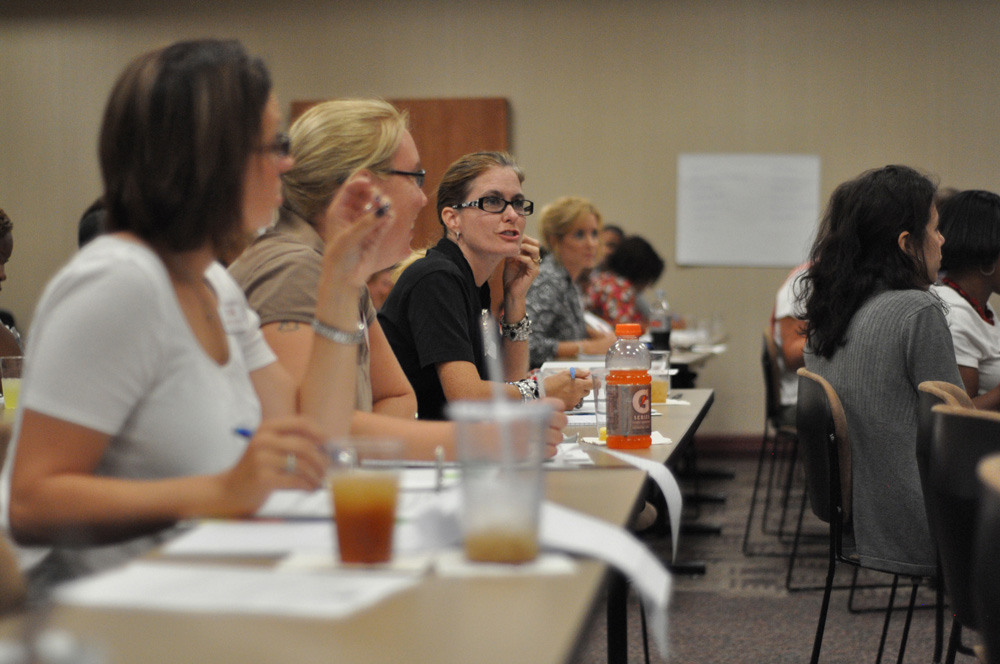By Dr. Heather Pleasants
Director, CCBP Office of Community Education
(The following profile looks at the Parent Leadership Academy (PLA), one of this campus’ leading engaged scholarship projects.)
It has been my privilege to direct the PLA almost since its founding in 2007, but I will be the first to say that the program’s continual success would not have been possible without the teamwork developed through a strong partnership between the parents, Tuscaloosa City and County public schools, and the University.
Here are just a few of the reactions to the program by parents and educators:
“PLA went way beyond what I was expecting. I learned so much from other parents, and from the speakers.”
“The PLA story is one of empowerment and engagement … (where) parents develop the knowledge necessary to make them effective partners in the work of our schools.”

“I have observed parents blossom as a result of their participation in the Parent Leadership Academy.”
The purpose of PLA is simple to state but complex in its execution: Its purpose is to prepare parent leaders in areas of knowledge relevant to their children’s education so that they can actively share that knowledge with other parents to create strong parent communities within their schools. PLA participation builds parental involvement and academic success within individual schools and ultimately within the district as a whole.
For several years before the PLA began, local school officials, teachers and community-involved UA faculty and administrators engaged in ongoing dialog about critical needs of public schools. The community was challenged to create and implement a strategy to educate and support parent leaders who would “grow their own” engaged parent communities. Local schools partnered with UA faculty, staff and students to develop the PLA as a yearlong leadership program for parents nominated by area principals.
PLA parents participate in the academy to gain knowledge about how to help other parents be positively involved in their schools with the goal of supporting students’ academic achievement. As indicated through surveys and other research, PLA parents recognize that gaining increased knowledge about their schools and sharing that information with other parents can be critical to school success. Through parent leadership projects and parent action teams, these motivated, well-informed parents are truly making a difference in the lives of the students in our community.
Now entering its seventh year, the PLA has worked with more than 200 parents who, in turn, have involved hundreds of other parents in becoming parent leaders. Students from throughout the two city and county school districts now have the support of parents, educators and the community working together to provide the foundation for improved academic and social success.

Recently, this success received national recognition, when Tuscaloosa’s school boards and PLA leaders accepted a Magna Award, one of only 15 nationally to receive the award in 2013. This award, based on best practices in local school districts, is sponsored by the National School Boards Association’s American School Board Journal. Though both city and county school boards were acknowledged in the application, the award was made to the Tuscaloosa City Board of Education.
From its inception until its present form, the PLA has exemplified an integrated partnership within every aspect of the model. Key community and university partners include city and county superintendents, district staff charged with promoting parental involvement and academic achievement, principals from all city and county elementary schools, guidance counselors and other school staff, community organizations that serve children and families, the West Alabama Chamber of Commerce, and faculty, staff and students from UA’s College of Education, College of Human Environmental Sciences, and Division of Community Affairs.
The development of the PLA has been guided by an emphasis on valuing all partners and the work they do through the PLA.
Through the PLA, parents are asked to initiate proactive conversations with principals, to attend and speak at school board meetings, and to talk with others in the PLA and in their schools about issues relevant to their school communities. Feedback from parents is gathered during and after each session, and PLA graduates have been special speakers at graduation ceremonies over the past three years of the PLA. Principals are also empowered through the PLA process, through engaged conversations about the process and outcomes of the PLA, through active involvement in sessions, and through work with their school’s PLA participants.
Sustaining Funds and Building Hours of Service
The success of PLA over the past six years has come from an investment of over 7,000 accumulated hours of work by parents, teachers and students. Launched with a $10,000 seed fund donation from UA, the city and county school districts have received outside funding and also contributed from their operating funds $38,400 annually to sustain and grow the program.
Additional grant applications have been submitted to expand the program. One PLA participant recently received a competitive UA seed grant to support her parent project to improve science and math education at Faucett Vestavia Elementary School. Another PLA project involved the formation of a grant-seeking subcommittee of the PTA that remains very active and is supported by PLA graduates and involved parents at the school.
Impacts are measured by parent activities and involvement in schools. One PLA graduate was invited to serve on the Superintendent’s Advisory Committee, gaining a critical seat at the table, as well as further opportunity to put her PLA-inspired leadership skills to work. During 2011–2012, Southview Elementary implemented a program facilitated and organized by parents and teachers to provide small group workshops for parents regarding curriculum.
Additional graduates have served in a leadership capacity for local educational initiatives such as the Westside Scholars Academy, which is an “academically challenging enrichment program” designed to support students’ “intellectual and social capacities … while contributing to the assets of the West Side community of Tuscaloosa,” according to the organization’s website, www.wsscholarsacademy.org).
We have been invited to talk about the PLA at the Alabama PTA Convention, the conference of Doing What Matters for Tuscaloosa’s Children Conference, the Optimist Club, Tuscaloosa Rotary, and District IV Federal Program Officers’ meetings. We are now expanding to other school districts. UA faculty and administrators are working with new partners, including Bessemer City Schools, and Lamar County Schools.
Research-Based Model
From the outset, the PLA model has been “research-based” in terms of its practices and strategies, with an emphasis on “context-based teaching and learning experiences.” In formulating the PLA model, we have identified successful, research-informed parent involvement programs that could serve as an initial framework. The emphasis on research is carried out in each PLA session. For example, each presenter/workshop facilitator is evaluated by parents to gain information about the effectiveness of the presentation and the utility of the information discussed.
Additionally, parents complete pre and post surveys that measure levels and changes in leadership self-efficacy, levels of communication with principals and other parents, perceptions of knowledge, and perceived current and future levels of engagement. Also, direct assessments of parents’ knowledge growth are collected at various points in the PLA year. Preliminary analysis of this data shows dramatic increases in parents’ knowledge about key issues, for example Alabama College- and Career-Readiness Standards (CCRS) and school finance.
In working with parents within and across each session, emphasis is placed on providing experiences that are interactive, involve active dialogue, and give specific attention to assisting parents with strategies for sharing information with other parents.
Through the PLA, faculty and graduate students in the College of Education and the College of Human Environmental Sciences have had direct experience in teaching, research and outreach in the area of parent involvement. UA faculty and graduate students have regularly made presentations to PLA participants, as have staff from both school districts. Graduate students have also made presentations about the PLA to a variety of audiences, and have participated in the creation of peer-reviewed research presentations.
Through the development of the PLA, The University of Alabama has deepened and strengthened its relationships with both school districts. These collaborative relationships have led to additional partnerships and engaged scholarship opportunities, through work with principals and with PLA graduates. Overwhelmingly, PLA graduates find sessions informative, helpful and renewing in their ability to positively impact their school communities.
Application Stressed
Prior to each session, we meet with every presenter/facilitator to ensure that how to apply the information, not just its presentation, is a central component. There was also interest in implementation of knowledge acquired. Parents were required to create a project at their schools that would significantly impact parental involvement and academic achievement. Interview data suggest that many of the projects designed continue to be implemented within schools.
Among the best practices sustained through six years of PLA are the following: full utilization of the knowledge possessed by individuals from the community and university as a support for parents’ learning; regular communication (including social media) with all stakeholders to build and sustain parent involvement over time; and active application of knowledge gained through the PLA through Parent Leadership Projects (with an emphasis on sustaining projects over time and inserting engaged scholarship principles within the projects themselves).
Summary and Future
The PLA has increased parent participation in the schools that are part of the network. We are continuously exploring ways to expand our network of schools and parents because the PLA is a working model for building leadership capacity among parents. To that end, the University has initiated plans to develop the Parent and Teacher Leadership Institute (PTLI) to focus specifically on developing leadership capacity among parents and teachers to increase the collaboration between school and home. Teachers and parents are crucial to overall student achievement. Therefore, the primary tenets of the PTLI will be professional development of teachers and parents to increase their leadership capacity, with the overall purpose of supporting students and increasing their academic achievement. The purpose will be to expand PLA, create a Teacher Leadership Academy (TLA), and develop a research and and effective practice clearinghouse.
The expanded PLA will reach more elementary parents in the West Alabama area, and add pre-K parents to the program. The TLA, set to begin as a pilot in fall 2013, will mirror the PLA and will include a network of elementary teacher leaders dedicated to expanding schools’ capacities for engaging parents and families. The research and effective practice clearinghouse will be a web-based collection of digital resources available to anyone interested in our research-based materials for parent and teacher leadership and engagement. For example, our curricular materials, videos of parent projects, and advocacy strategies would be readily available.
Dr. Samory T. Pruitt, vice president for Community Affairs, has great confidence in the ability of PLA to improve education throughout Alabama. “The research clearly shows that if you support parents, then our homes, schools and communities will benefit in ways that will transform education in our state. The partnerships we have created are bringing about positive changes, and we look forward to another good year in 2014.”